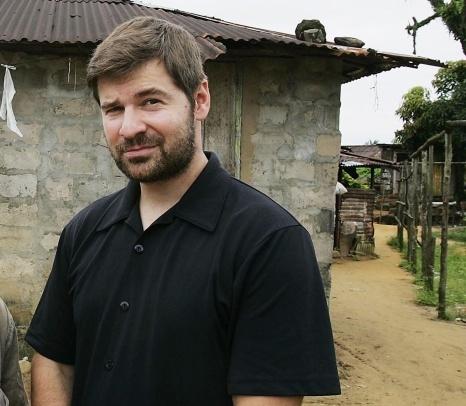Oscar nominee Tim Hetherington and acclaimed photojournalist Chris Hondros died Wednesday while chronicling the gritty violence in the war-torn city of Misrata in Libya, their agencies said.
*******************************************
Chris Hondros (March 14, 1970 – April 20, 2011) was a Pulitzer Prize-nominated war photographer.
He was born in New York City to immigrant Greek and German parents who were child refugees after World War II. From his base in New York, Hondros worked in most of the world's major conflict zones since the late 1990s, including Kosovo, Angola, Sierra Leone, Afghanistan, Kashmir, the West Bank, Iraq, and Liberia. His work appeared as the covers of magazines such as Newsweek and the Economist, and on the front pages of The New York Times, the Washington Post, and the Los Angeles Times.
Hondros's images from Iraq, especially a January 2005 picture series detailing the shooting of an Iraqi family by U.S. troops, were published extensively and garnered worldwide acclaim and criticism.
On January 18, 2005, an Iraqi family was traveling in a car which failed to stop at a U.S. checkpoint in Tal Afar. U.S. troops opened fire, killing both parents and injuring one of their five children sitting in the back seat. As a result of the worldwide interest in his case generated by Hondros's pictures, the boy was later flown to the United States for treatment in a Boston hospital. Hondros won dozens of international awards for the images.
In an interview, Hondros stated:
"Almost every soldier in Iraq has been involved in some sort of incident like that or another, I would say. Their attitude about it was grim, but it wasn't the end of their world. It was, "Well, kind of wished they'd stopped. We fired warning shots. Damn, I don't know why the hell they didn't stop. What're you doing later, you want to play Nintendo? Okay." Just a day's work for them. That stuff happens in Iraq a lot.
(From Wikipedia)
(Info courtesy of Tom Tippets)
Oscar nominee Tim Hetherington and acclaimed photojournalist Chris Hondros died Wednesday while chronicling the gritty violence in the war-torn city of Misrata in Libya, their agencies said.
*******************************************
Chris Hondros (March 14, 1970 – April 20, 2011) was a Pulitzer Prize-nominated war photographer.
He was born in New York City to immigrant Greek and German parents who were child refugees after World War II. From his base in New York, Hondros worked in most of the world's major conflict zones since the late 1990s, including Kosovo, Angola, Sierra Leone, Afghanistan, Kashmir, the West Bank, Iraq, and Liberia. His work appeared as the covers of magazines such as Newsweek and the Economist, and on the front pages of The New York Times, the Washington Post, and the Los Angeles Times.
Hondros's images from Iraq, especially a January 2005 picture series detailing the shooting of an Iraqi family by U.S. troops, were published extensively and garnered worldwide acclaim and criticism.
On January 18, 2005, an Iraqi family was traveling in a car which failed to stop at a U.S. checkpoint in Tal Afar. U.S. troops opened fire, killing both parents and injuring one of their five children sitting in the back seat. As a result of the worldwide interest in his case generated by Hondros's pictures, the boy was later flown to the United States for treatment in a Boston hospital. Hondros won dozens of international awards for the images.
In an interview, Hondros stated:
"Almost every soldier in Iraq has been involved in some sort of incident like that or another, I would say. Their attitude about it was grim, but it wasn't the end of their world. It was, "Well, kind of wished they'd stopped. We fired warning shots. Damn, I don't know why the hell they didn't stop. What're you doing later, you want to play Nintendo? Okay." Just a day's work for them. That stuff happens in Iraq a lot.
(From Wikipedia)
(Info courtesy of Tom Tippets)
Family Members
Sponsored by Ancestry
Advertisement
Explore more
Sponsored by Ancestry
Advertisement








